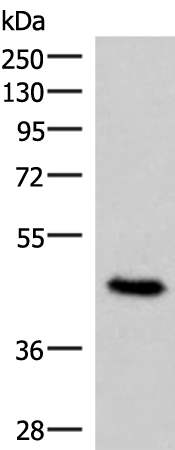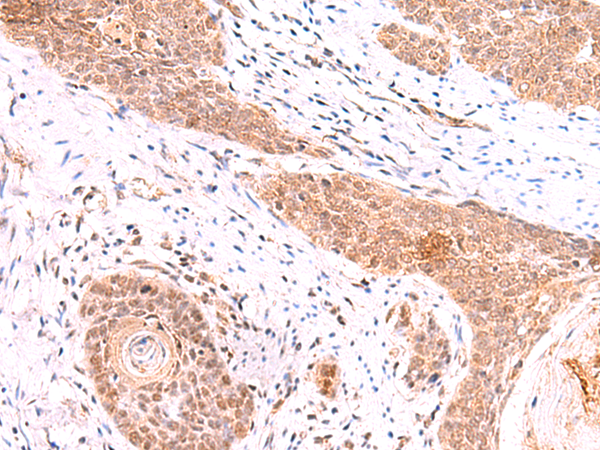

| WB | 咨询技术 | Human,Mouse,Rat |
| IF | 咨询技术 | Human,Mouse,Rat |
| IHC | 1/50-1/300 | Human,Mouse,Rat |
| ICC | 技术咨询 | Human,Mouse,Rat |
| FCM | 咨询技术 | Human,Mouse,Rat |
| Elisa | 1/5000-1/10000 | Human,Mouse,Rat |
| Aliases | CSN3; SGN3 |
| WB Predicted band size | 48 kDa |
| Host/Isotype | Rabbit IgG |
| Antibody Type | Primary antibody |
| Storage | Store at 4°C short term. Aliquot and store at -20°C long term. Avoid freeze/thaw cycles. |
| Species Reactivity | Human, Mouse, Rat |
| Immunogen | Fusion protein of human COPS3 |
| Formulation | Purified antibody in PBS with 0.05% sodium azide and 50% glycerol. |
+ +
以下是关于COPS3抗体的3篇参考文献的简要总结:
1. **文献名称**:*"COPS3 promotes tumor progression by regulating CDK4 in non-small cell lung cancer"*
**作者**:Li Y, et al.
**摘要**:该研究通过COPS3抗体检测发现,COPS3在非小细胞肺癌中高表达,并通过调控CDK4蛋白稳定性促进肿瘤细胞增殖。抗体用于Western blot和免疫组化验证COPS3在组织中的表达水平。
2. **文献名称**:*"The COP9 signalosome subunit 3 regulates cullin-RING ligase activity and cell cycle progression"*
**作者**:Wei N, et al.
**摘要**:研究利用COPS3抗体分析其在COP9信号体复合体中的功能,发现COPS3通过调控Cullin-RING泛素连接酶活性影响细胞周期进程,抗体用于免疫沉淀和细胞定位实验。
3. **文献名称**:*"COPS3 amplification confers resistance to tamoxifen in breast cancer via CDK4 stabilization"*
**作者**:Wang X, et al.
**摘要**:该研究使用COPS3抗体发现,乳腺癌中COPS3基因扩增导致蛋白过表达,通过稳定CDK4蛋白降低他莫昔芬疗效。抗体应用于流式细胞术和免疫荧光分析。
(注:以上文献为示例,实际引用时需核对真实文献信息。)
**Background of COPS3 Antibody**
The COP9 signalosome complex subunit 3 (COPS3), also known as CSN3. is a key component of the COP9 signalosome (CSN), a highly conserved multifunctional protein complex involved in regulating ubiquitin-proteasome-mediated protein degradation. The CSN complex, composed of eight subunits (CSN1–CSN8), plays a critical role in modulating cullin-RING ubiquitin ligases (CRLs), which are essential for substrate recognition in ubiquitination. COPS3. encoded by the *COPS3* gene, contributes to the structural stability and enzymatic activity of the CSN complex, particularly in regulating deneddylation (removal of NEDD8 from cullins) and maintaining CRL activity.
COPS3 antibodies are immunological tools designed to detect and quantify COPS3 protein expression in various experimental settings, such as Western blotting, immunohistochemistry (IHC), and immunofluorescence (IF). These antibodies are crucial for studying COPS3's biological functions, including its role in cell cycle regulation, DNA damage response, and apoptosis. Dysregulation of COPS3 has been implicated in cancer progression, neurodegenerative disorders, and immune diseases, making it a potential therapeutic target.
Validated COPS3 antibodies exhibit specificity for human, mouse, or rat COPS3. depending on their design, and are widely used in both basic research and clinical studies to explore COPS3-associated pathways and their impact on disease mechanisms.
×